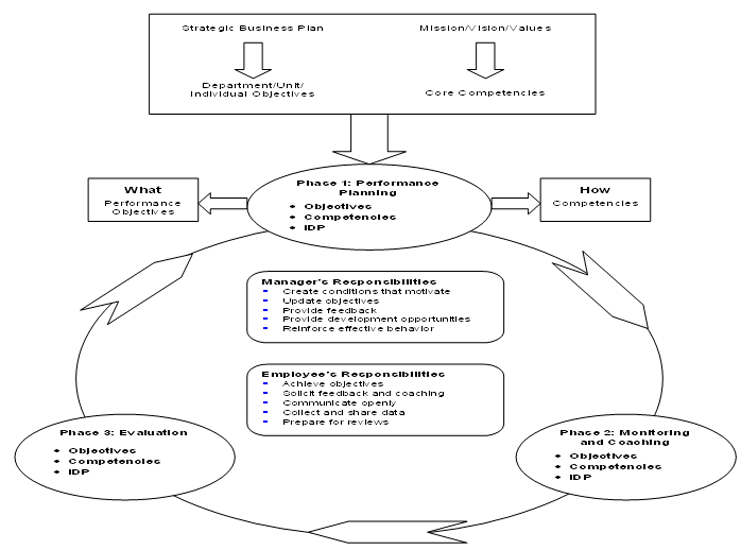Components of Performance Management System
April 3, 2025
 Components of Performance Management System
Components of Performance Management System
Any effective performance management system includes the following components: Performance Planning: Performance planning is the first crucial component of any performance management process which forms the basis of performance appraisals. Performance planning is jointly done by the appraisee and also the reviewee in the beginning of a performance session. During this period, the employees decide…
 Benefits of a Performance Management System
Benefits of a Performance Management System
A good performance management system works towards the improvement of the overall organizational performance by managing the performances of teams and individuals for ensuring the achievement of the overall organizational ambitions and goals. An effective performance management system can play a very crucial role in managing the performance in an organization by: Ensuring that the…
 Absenteeism at Work and its Implications for Organizational Performance
Absenteeism at Work and its Implications for Organizational Performance
Absenteeism and its Perils Absenteeism or taking leave from work is a growing problem for many organizations that have to deal with the loss of employee time and productivity which then result in decreased earnings and revenues for these organizations. While legitimate leave of absence from work is usually taken as the norm and is…
In the present business environment of cut throat competition and globalization, competency based practices have gained much of an attention from the contemporary organizations. They aim at achieving an optimum performance in the long term by developing the skills and competencies of the employees on a continuous basis.
Competency based management systems are primarily employee centric performance management systems and focuses upon how an organization achieves a desired performance. By aligning competencies within the performance management framework, the supervisors provide a feedback to the employees on the performance goals achieved and how the work was performed.
Competency focused performance management systems can serve as a useful tool for helping the employees in understanding the performance expectations and improving the competencies. Competency based management are strategic in nature and influences almost every area of human capital management which starts with the hiring of an employee and ends with the retirement. It aims at standardizing and integrating all HR activities by relying upon competencies which support fulfillment of organizational goals.
For example, Maruti Udyog Limited which was a joint venture with Suzuki of Japan realized the need of aligning HR strategies with the corporate strategies by linking competency mapping with the major systems of HR.
Deregulation in India in 1998 drastically declined the market share of Maruti which was earlier the undisputed leader in the automobiles industry. Reforms like competency mapping, job rotations, improvements in the appraisal system, initiatives in implementation of a transparent system of feedback and communication, clear definition of job profiles and their accountabilities and many others, improved the competitiveness of Maruti.
Performance management systems are based on personal competencies which distinguish high performers from the average performers and the personal competencies are derived from the values and core competencies of an organization (Reagan, 1994).
According to Collins and Porras (1996), organizations which use core competencies based systems are regarded as high performers or visionaries.
Competencies are primarily job specifications concerned with the knowledge, skills and abilities of an individual which defines the personal as well as the organizational success (Englemann Roesch, 1996). The same researchers listed personal competencies as achievement orientation, team work, analytical thinking, relationship building, customer service orientation, etc.
Individual competencies drive excellence in an organization as they are utilized as a yardstick for evaluating and monitoring both individual and organizational performance and their effectiveness (Antonacopoulou FitzGerald, 1996).
Competencies can be integrated with the performance management process by any of the two ways:
The performance goals/objectives deal with the aspect of what must be achieved over the entire period of review and the competencies address the question of how an employee achieved the pre determined performance goal by demonstrating an expected pattern of behavior.
Competencies are aligned in each phase of the performance management cycle. CPS Human Resource Services has designed a model on Strategic Performance Management which is given below:

CPS Human Resource Services treats the process of performance management as a gap closing strategy, which focuses upon the vision, mission and values of the organization, the goals and objectives of the agency, individual goals and objectives and also the core competencies.
Organizations like Wipro and Infosys, the major IT giants of India give a lot of importance to competency based performance management system. In Wipro, the performance management process begins with the identification and assessment of critical competencies for top management, senior management and middle management on the basis of critical incidents, focus groups and rigorous interviews.
360 degree feedback is used for providing a feedback on the existing competencies of the employees and based on the results of the feedback a training programme is organized for improving the deficit areas of performance.
Finally, personal development plans are formulated for each employee for monitoring and tracking the improvement in competencies or skill sets. For building competencies, Wipro focuses on strategic thinking, vision, building star performers and global focus. Infosys equally gives a lot of importance to 360 degree feedback for evaluating the critical leadership competencies of their employees.
Your email address will not be published. Required fields are marked *